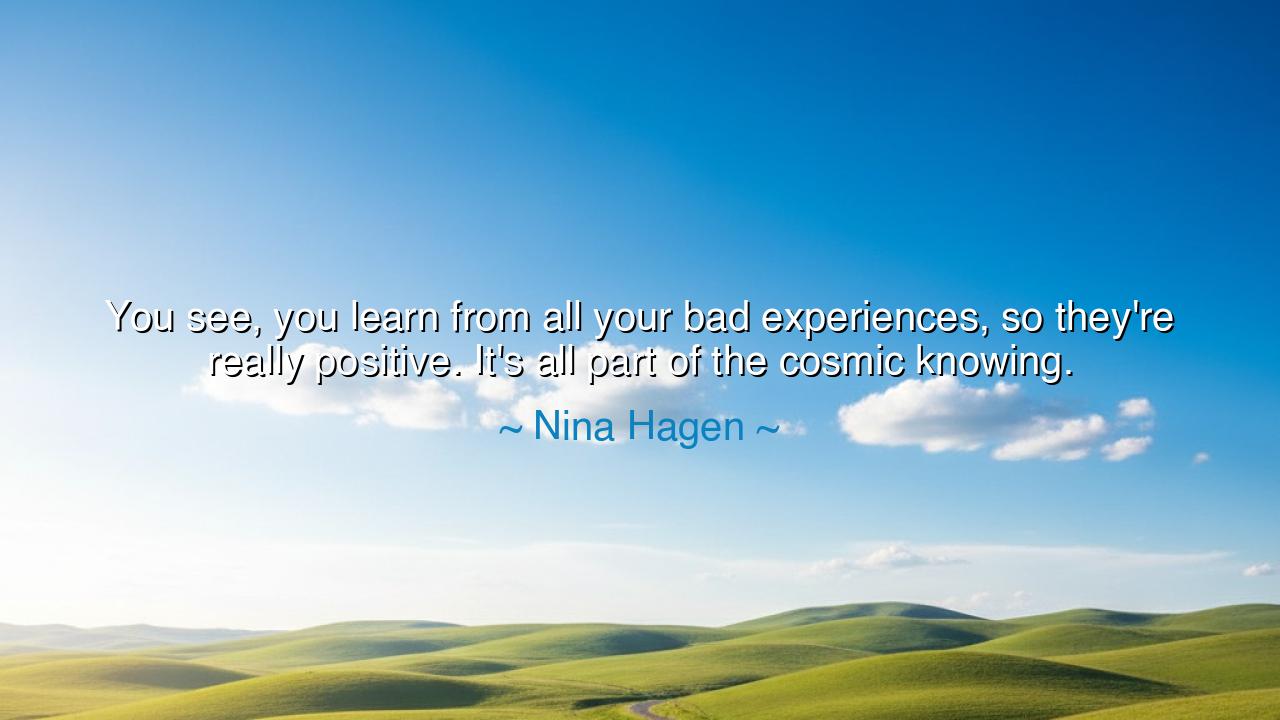
You see, you learn from all your bad experiences, so they're
You see, you learn from all your bad experiences, so they're really positive. It's all part of the cosmic knowing.






In the words of Nina Hagen, we hear a wisdom that echoes through the chambers of time: “You see, you learn from all your bad experiences, so they're really positive. It's all part of the cosmic knowing.” These words remind us that suffering is not merely a burden, but a teacher sent by the heavens. The ancients knew this truth well. To stumble is not to fail, but to receive instruction; to fall is not to be cursed, but to be shaped. Every hardship, every trial, every sorrow becomes a thread in the great tapestry of cosmic knowing, where nothing is wasted, and all things are transformed into wisdom.
Consider the journey of the philosopher Socrates, who was condemned unjustly to death by hemlock. Many would see in his trial only bitterness, only injustice. Yet he received his fate with calm, declaring that death was not to be feared, for it was either a dreamless sleep or a passage to another life where the soul might dwell among the wise. His bad experience, the cruel end imposed upon him, became for the world a seed of positive knowledge: that the soul’s dignity can remain unbroken even when the body perishes. Through suffering, he revealed the greatness of the human spirit.
Nina Hagen’s words remind us that the universe itself is a school, and we are its pupils. When storms strike us—be they betrayals, failures, illnesses, or losses—we are not abandoned. Rather, the cosmos whispers to us lessons that cannot be learned in ease. The fire refines gold; the sea tempers the sailor; the battlefield trains the warrior. In the same way, our bad experiences refine our hearts and prepare us for higher understanding. Without them, our knowledge would be shallow, our compassion weak, our wisdom untested.
Think also of the story of Abraham Lincoln, who in his life faced repeated defeats—failed business ventures, lost elections, even a nervous breakdown. Many men would have surrendered under such weight. But each setback became a forge, strengthening his resolve, sharpening his vision. When at last he rose to lead a fractured nation, his wisdom was born not of triumphs alone, but of wounds endured. His greatness was the fruit of his bad experiences, transformed into guidance for millions. Such is the truth of cosmic knowing: that nothing is wasted in the soul’s journey.
The lesson, O children of time, is that we must not curse our pain too quickly. Let us not despise the days of hardship, for hidden within them are treasures. When we are struck down, let us ask, “What is this moment teaching me? What strength am I to uncover? What truth am I being shown?” If we carry this question, every sorrow becomes a lantern, lighting the path ahead. Bad experiences then cease to be chains and become stepping stones to a higher place of being.
Practically, this can be lived by keeping the discipline of reflection. When hardship visits, do not rush to distraction or bitterness. Instead, write of it, speak of it, pray over it. Search within yourself for the lesson hidden there. Make it your practice, after each trial, to note what you have gained—be it patience, courage, humility, or compassion. Over time, you will see that your life is not a series of random blows, but a carefully woven pattern of teachings.
And so, let Nina Hagen’s wisdom stand as a testament: that nothing in this vast cosmos is wasted. Every failure, every heartbreak, every dark night of the soul—these are gifts in disguise, offerings of the universe to those who are willing to learn. Embrace them, and you will walk in the company of the wise. Reject them, and you will remain forever unformed. The choice is yours.






NNNhyy Ngoc.
Reading this makes me think about cultural and spiritual interpretations of life challenges. How does the concept of ‘cosmic knowing’ influence the perception of events as inherently positive or instructive? Could this perspective be comforting in moments of despair, or might it risk detaching individuals from practical solutions to problems? Examining these angles could reveal how philosophical or spiritual frameworks shape resilience and the meaning we assign to both success and failure.
XTmai xuan truong
I find this viewpoint intriguing but also wonder about its practical application. How can someone consistently turn negative experiences into positive insights without becoming cynical or overly philosophical? Does Hagen’s idea suggest that every difficulty inherently has value, or is it a mindset cultivated over time? Considering these questions could shed light on strategies for personal growth and the psychological benefits of reframing adversity as part of a larger cosmic or life perspective.
LLLh Lh
This statement sparks curiosity about the balance between optimism and realism. While learning from bad experiences can be empowering, is there a risk of oversimplifying or dismissing genuine suffering? How does one differentiate between seeing experiences as learning opportunities and avoiding necessary emotional processing? Understanding this nuance could illuminate how people navigate challenges without minimizing their impact or the complexity of the lessons they offer.
MTHa Mai Trang
Nina Hagen’s perspective makes me reflect on the concept of reframing adversity. Can viewing negative experiences as positive lessons genuinely change how we process trauma or failure? Does this approach rely on a spiritual or philosophical framework, like her reference to ‘cosmic knowing,’ or is it more psychological? Exploring how people transform hardship into growth could provide insight into resilience, personal development, and the ways belief systems shape our interpretation of life events.